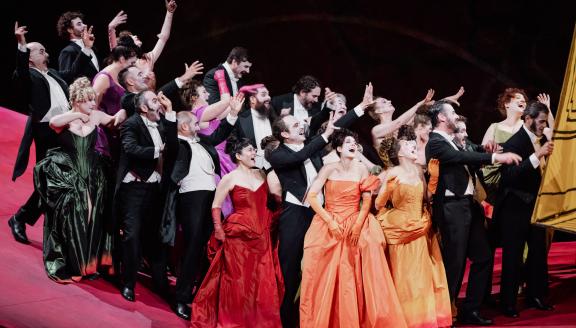Free opera stream: More bats than balls at Lille
OperaSlippedisc, courtesy of OperaVision, is streaming Die Fledermaus today. Johann Strauss II’s comic operetta in three acts premiered in 1874 and has become a synonym of the operetta genre. In only six years, the operetta was staged in more than 170 theatres in the German-speaking regions and, by the 1890s, was performed all over the world. The libretto was written by Richard Genée and Karl Haffner after the burlesque The Prison by Julius Roderich Benedix and vaudeville piece Le Révellion by Henri Meilhac and Ludovic Halévy. The emblem of Viennese refinement, here the new production from Opéra de Lille returns Die Fledermaus to these origines with song and dialogue in French. The staging is entrusted to the colourful imagination of Laurent Pelly. A master of comedy – as seen in his recent Meistersinger from Madrid – Pelly is able to indulge his taste for zany situations with precision, elegance and charm. This is sparkling Chauve-Souris turned on its head… which, as it were, is the Bat’s most natural position.
Sung in French with subtitles in English and French.
The Plot: the most brilliant of Austrian operettas takes us to the outskirts of romantic Old Vienna. It’s New Year Eve and we are in the company of Caroline, who is determined to teach her philandering husband Gaillardin a lesson, even while she is being pursued by her former beau, the operatic tenor Alfred. At the centre of the action is the extremely wealthy, eternally bored Prince Orlofsky, whose lavish masked ball brings everything to a most delicious boil. But what if the whole plot has been a cunning plan masterminded by someone just to get back at Gaillardin?
Streaming on Friday 13th September 1900 CET / 1800 London / 1300 New York






Comments